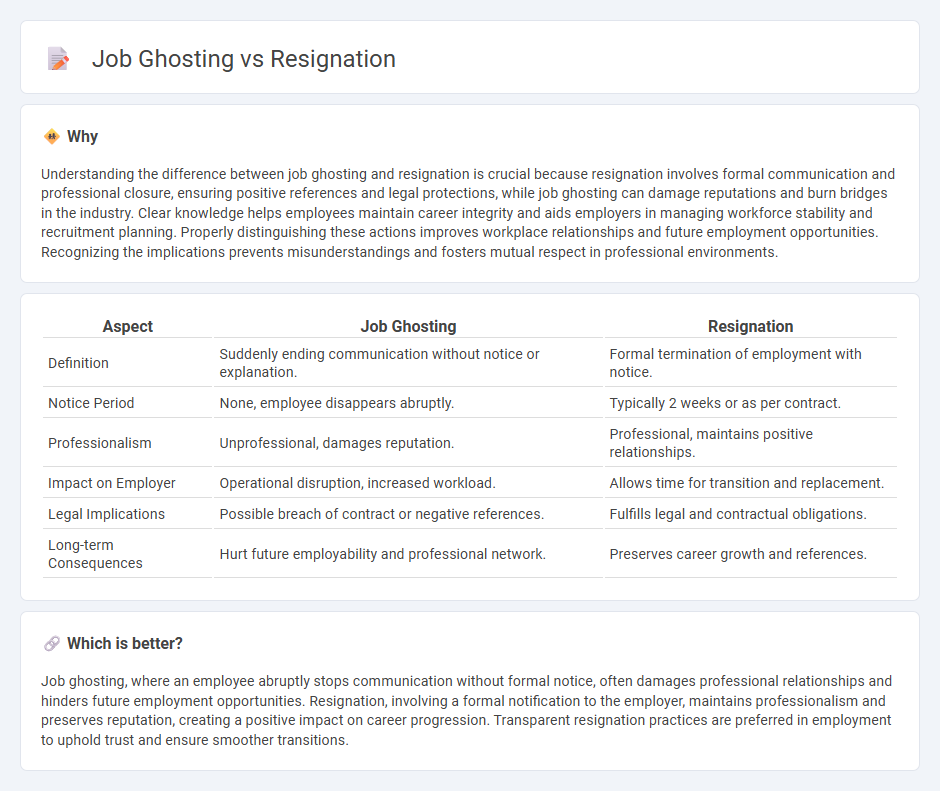
Job ghosting occurs when an employee abruptly stops communication and fails to show up for work without notice, often leaving employers unprepared. In contrast, resignation involves a formal process where the employee provides advance notice and follows company protocols to exit the job professionally. Discover the key differences and impacts of job ghosting versus resignation to navigate your career decisions more effectively.
Why it is important
Understanding the difference between job ghosting and resignation is crucial because resignation involves formal communication and professional closure, ensuring positive references and legal protections, while job ghosting can damage reputations and burn bridges in the industry. Clear knowledge helps employees maintain career integrity and aids employers in managing workforce stability and recruitment planning. Properly distinguishing these actions improves workplace relationships and future employment opportunities. Recognizing the implications prevents misunderstandings and fosters mutual respect in professional environments.
Comparison Table
| Aspect | Job Ghosting | Resignation |
|---|---|---|
| Definition | Suddenly ending communication without notice or explanation. | Formal termination of employment with notice. |
| Notice Period | None, employee disappears abruptly. | Typically 2 weeks or as per contract. |
| Professionalism | Unprofessional, damages reputation. | Professional, maintains positive relationships. |
| Impact on Employer | Operational disruption, increased workload. | Allows time for transition and replacement. |
| Legal Implications | Possible breach of contract or negative references. | Fulfills legal and contractual obligations. |
| Long-term Consequences | Hurt future employability and professional network. | Preserves career growth and references. |
Which is better?
Job ghosting, where an employee abruptly stops communication without formal notice, often damages professional relationships and hinders future employment opportunities. Resignation, involving a formal notification to the employer, maintains professionalism and preserves reputation, creating a positive impact on career progression. Transparent resignation practices are preferred in employment to uphold trust and ensure smoother transitions.
Connection
Job ghosting, where employees abruptly stop communicating without formal notice, directly impacts resignation processes by undermining professional closure and workflow continuity. This behavior creates challenges for employers in planning human resources, often leading to increased turnover rates and recruitment costs. Understanding the connection between job ghosting and resignation highlights the need for effective communication policies and exit strategies in organizational employment practices.
Key Terms
Notice Period
Resignation involves formally notifying an employer of your intention to leave, typically honoring a contractual notice period to ensure a smooth transition. Job ghosting, by contrast, is abruptly ceasing communication with the employer without any prior notice, often damaging professional reputation and future job prospects. Learn more about the impacts and best practices for handling notice periods in career transitions.
Communication
Resignation involves clear, professional communication, typically including a formal notice to the employer, which helps maintain positive relationships and allows for a smooth transition. Job ghosting, the act of abruptly disappearing without notification, damages trust, disrupts workflows, and reflects poorly on the individual's professionalism. Explore effective communication strategies to ensure respectful and transparent departure processes.
Professionalism
Resignation demonstrates professionalism by providing notice, facilitating a smooth transition, and maintaining positive relationships with employers. Job ghosting, in contrast, reflects unprofessional behavior that can damage reputations and burn bridges in future career opportunities. Explore best practices to uphold professionalism during career changes.
Source and External Links
Resignation - Wikipedia - Resignation is the formal act of relinquishing or vacating one's office or position, typically voluntarily by the person holding the position, distinguishing it from involuntary termination or the expiration of a term.
How to write a formal resignation letter, with examples - Writing a formal resignation letter professionally notifies your employer of your intent to leave, provides details of your employment and departure, and helps ease the transition, commonly with a two-week notice period.
RESIGNATION | Cambridge English Dictionary - Resignation means the act of telling your employer you are leaving your job and can also refer to acceptance or acknowledgment of an unpleasant situation.
 dowidth.com
dowidth.com